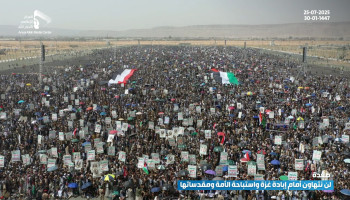Published: Muharram 29, 1447 AH
The Yemeni people have dared to achieve what entire nations and armies have failed to do: they have struck at the very lifelines of the U.S.-Israeli economic system in the Red Sea, bringing it to a halt. They have gone further still, placing the entire Zionist entity under direct threat—from Haifa to Eilat to Jaffa—not out of a desire for material gain, but in solidarity with the wounded in Gaza and in defense of their brothers crushed beneath the fangs of the Zionist war machine. These are not random strikes; they are deliberate messages, encoded with warning and clarity, exposing the fragility of hollow alliances that collapse in the face of a divine will—manifested in the steadfast resolve of the Yemeni people.
The Red Sea and Lod Airport have become mirrors reflecting the defeat of global powers that have stooped to serve as the tail of the usurping Zionist entity. Their ships now roam the waters in fear, their economic interests unraveling, and their military image tarnished with disgrace.
Yemeni resolve has shattered the myth of invincibility and fractured the illusion of absolute control, declaring to the world that the decisive word will be spoken in occupied Palestine and the Red Sea — and that the era of American diktats has ended, once and for all. This is the dawn of victory. There is no retreat for those whose guiding light is the Qur’an and whose strength lies in the Lord of Might.
These are not mere slogans, but truths confirmed by unfolding events and acknowledged by friend and foe alike. The British newspaper Daily Mail affirmed that the Yemeni attacks represent a qualitative shift in the course of this open conflict, with repercussions that extend far beyond immediate military considerations. These strikes expose the vulnerability of the Western system and its faltering ability to protect its interests in international waters.
The report highlighted that the operations carried out by Yemen—utilizing anti-ship missiles and explosive-laden drones, both aerial and maritime—have laid bare the limited effectiveness of American and Israeli defense systems, and the failure of airstrikes to degrade Yemen’s military capabilities or to halt its expanding campaign against naval targets.
The Daily Mail quoted analysts as stating that these operations represent a double failure for both the United States and Israel. Former U.S. President Donald Trump's threats to eliminate the Ansar Allah group have failed, while the Yemeni side has responded by restructuring its operations and launching increasingly complex attacks.
The Wall Street Journal reported that at the time the two ships were struck from Yemen, no U.S. or British naval vessels were present near the scene. The report, citing American and European naval officials, confirmed the complete absence of Western naval forces in the area.
The newspaper also quoted a former British military officer working for a maritime security firm, who confirmed that commercial ships are entirely exposed in the most dangerous zones of the Red Sea, bluntly stating: “You are on your own.”
Enforcing a Fiery Boycott on the Zionist Entity
In the same context, Reuters reported that commercial vessels still navigating the Red Sea have begun transmitting information about the nationalities—and even the religions—of their crew members via tracking systems, along with affirmations that they have no connection to Israel, in an effort to avoid being targeted.
The agency expressed concern over the decision by some ship crews to display slogans such as “We are Muslims” or “We have no ties to Israel,” viewing this as a troubling sign that many vessels are reluctant to sail toward Israeli ports again, fearing they might come under attack.
Meanwhile, the Hebrew-language newspaper The Jerusalem Post concluded that the failure of foreign fleets to intervene in defense of the targeted ships or to deliver a swift deterrent response signals that such attacks are no longer being treated as a top priority by either Washington or Tel Aviv.
The Yemenis are well aware of this shift—making them more willing and bold in launching further precision operations.
The paper added that last week’s events raise serious questions about Western preparedness and the credibility of the so-called "Prosperity Alliance," at a time when Sana’a is steadily advancing toward enforcing its sovereign equation in the Red Sea—not merely as a slogan, but as an operational reality that is redefining the balance of deterrence regionally and internationally.
A "Black Hole" Devouring Western Calculations
The British strategic consultancy firm Azure Strategy stated in a recent report that the latest attacks carried out by Yemeni armed forces on commercial ships in the Red Sea have unequivocally demonstrated that Yemen now holds significant leverage in regional and international security equations. The Ansar Allah movement has evolved beyond a mere local faction to become a formidable regional actor that the world can neither ignore nor bypass.
The report emphasized that these attacks not only showcase the group’s military and political resilience but also reveal a notable advancement in their deterrence and maneuvering capabilities, amidst profound international shifts and the gradual decline of Western dominance.
It further pointed out that Ansar Allah’s operations are driven not solely by tactical considerations but by a dual strategy: firstly, to remind the world that the Red Sea is no longer a safe passage for Israeli occupation forces and their allies as long as the aggression and blockade on Gaza persist.
The report concluded that the West, led by the United States, has failed to curb the Yemeni forces despite launching major military operations such as "Operation Prosperity Guardian" and "Poseidon Archer," and despite reclassifying Ansar Allah as a “foreign terrorist organization.” These approaches have proven ineffective in establishing genuine deterrence because Yemen does not rely on conventional military infrastructure or traditional army tactics. Instead, it employs high adaptability and a combat engineering approach that leverages geography and popular support.
The report described the Houthis as “a black hole in Western calculations”—impenetrable, with scarce intelligence available on them—and their ability to withstand successive strikes is a testament to their deep entrenchment in Yemen’s reality.
Yemenis Triumphed and Shut Down "Eilat" port
Even within Zionist circles, there is open acknowledgment of the effectiveness of Yemeni strikes and the inability of Western coalitions to make any significant impact in the battle against Yemen. Zionist media personality Udi Etzion revealed in an interview with 103FM radio a new collapse affecting the Zionist system, confirming that the strategic port of Eilat has been shut down due to the blockade imposed by Yemen. Etzion admitted that what is happening is a “dramatic event in every sense of the word,” stating “the Houthis have won here and literally closed the port in our face,” after the occupation failed to secure maritime routes and has been in a state of naval paralysis for three consecutive years.
He added that “the port, once considered a strategic gateway for the entity towards the East—through which most Japanese and Chinese cars passed—is now unable to pay taxes and is lacking liquidity, after the municipality of Eilat confiscated its bank accounts and issued a decision to close it starting Sunday, July 20.” He quoted the port administration as saying plainly: “We have no money, accounts are confiscated, and we will shut down.”
Failure of Western Coalitions
Business Insider reported that Europe has effectively become unable to protect navigation routes in the Red Sea, acknowledging the failure of the EU-led "Operation Aegis" mission to counter attacks by Yemeni naval forces. According to Admiral Vasileios Grivas, commander of the European mission, the average number of warships operating daily within the Red Sea does not exceed one ship, which he described as "insufficient to secure a vast operational area extending from the Red Sea to the Gulf."
The European commander admitted that the mission relies on voluntary contributions from member states and lacks the authority to compel the deployment of ships or to reinforce naval presence. He pointed out that ships under attack that do not request protection are left to their fate, preferring to take risks rather than wait for the "next available protection opportunity."
While Europe has promoted Operation Aegis as a defensive shield to protect commercial shipping, the reality—as reported by the newspaper—is that it is largely a symbolic presence in the face of escalating operations by the Yemeni military, which continues its precise attacks in the Red Sea, sinking two ships just last week. Business Insider described these attacks as a "worrying development," according to Grivas, but noted they did not come as a surprise, especially following the U.S. withdrawal from offensive operations in May under the ceasefire agreement with Sana’a.
Yemen Instills Fear in Naval Fleets
The British magazine The Economist published a report revealing the growing strength of Yemen’s naval capabilities and its continued precision strikes on vessels belonging to or cooperating with the Zionist entity in the Red Sea.
The magazine noted: “Despite recent claims by Washington of defeating the Houthis, Yemen continues its naval operations, having carried out two targeted attacks in less than a week, sinking two commercial ships—Magic Seas and Eternity Sea—on July 6 and 7 respectively.”
The report highlighted that these attacks came two full months after Trump’s declaration that Ansar Allah had “surrendered” and pledged not to target ships again. However, the realities on the ground prove that the battle has not ceased.
The Economist described the recent strikes as a clear message to the world: control over the Bab al-Mandeb Strait belongs to Yemen, not Washington.
The magazine also pointed out that the global response has been cold, bordering on indifference, reflecting the depth of the Western dilemma in confronting Yemen and the difficulty of breaking its capabilities through military force.
It further explained that the U.S. has reduced its forces in the region and withdrawn some destroyers that were protecting commercial vessels, thereby allowing Ansar Allah to reaffirm Yemen’s deterrent power once again.







